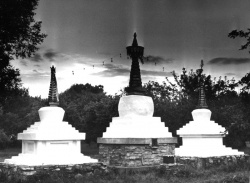Difference between revisions of "Building the first stupas of northern Europe in 1983–1985"
(Created page with "thumb|250px|First Stupa in Estonia thumb|250px|Estonian Stupas built 1983-1985 by Brotherhood In accordance with Buddh...") |
|||
| Line 1: | Line 1: | ||
[[File:First-stupa.jpg|thumb|250px|First Stupa in Estonia]] | [[File:First-stupa.jpg|thumb|250px|First Stupa in Estonia]] | ||
[[File:Estonian-stupas.jpg|thumb|250px|Estonian Stupas built 1983-1985 by Brotherhood]] | [[File:Estonian-stupas.jpg|thumb|250px|Estonian Stupas built 1983-1985 by Brotherhood]] | ||
| − | In accordance with Buddhist tradition, the Brotherhood started their activities by building a stupa. The first stupa was erected under the guidance of Väärtnõu in 1983 at the summer house of the artist Jüri Arrak in Pangarehe. In the construction work, Jüri, Urve and Jaan Arrak and the writer Jaanus Tamm helped. The upper part, which symbolises the heavens of Brahma, was made by Vigala Sass, who is known to the general public as a healer. | + | In accordance with [[Buddhist tradition]], the Brotherhood started their [[activities]] by building a [[stupa]]. The first [[stupa]] was erected under the guidance of Väärtnõu in 1983 at the summer house of the artist Jüri Arrak in Pangarehe. In the construction work, Jüri, Urve and Jaan Arrak and the writer Jaanus Tamm helped. The upper part, which symbolises the [[heavens]] of [[Brahma]], was made by Vigala Sass, who is known to the general public as a healer. |
| − | In 1984–1985, three more stupas were built in western Estonia at Siim Jõesaar’s place. In the construction work, all Taola members and faith-followers, along with the supporters Eve Kirsima, Riho Sild and many others, participated. | + | In 1984–1985, three more [[stupas]] were built in western {{Wiki|Estonia}} at Siim Jõesaar’s place. In the construction work, all Taola members and faith-followers, along with the supporters Eve Kirsima, Riho Sild and many others, participated. |
| − | These four stupas were the first stupas in northern Europe and the only stupas that were built in the territory of the Soviet Union during the Soviet times. | + | These four [[stupas]] were the first [[stupas]] in northern {{Wiki|Europe}} and the only [[stupas]] that were built in the territory of the Soviet Union during the Soviet [[times]]. |
| − | An old farmhouse was bought in western Estonia by Väärtnõu, whose idea was to establish a monastery and educate Estonians. The project for this future monastery was created by the architect Leonhard Lapin, and it was the first of its kind in Estonia. The construction was later halted by political action, as was the publication of the first Estonian schoolbook on the Tibetan language. | + | An old farmhouse was bought in western {{Wiki|Estonia}} by Väärtnõu, whose [[idea]] was to establish a [[monastery]] and educate Estonians. The project for this future [[monastery]] was created by the {{Wiki|architect}} Leonhard Lapin, and it was the first of its kind in {{Wiki|Estonia}}. The construction was later halted by {{Wiki|political}} [[action]], as was the publication of the first Estonian schoolbook on the [[Tibetan]] language. |
{{R}} | {{R}} | ||
Revision as of 05:08, 17 September 2013
In accordance with Buddhist tradition, the Brotherhood started their activities by building a stupa. The first stupa was erected under the guidance of Väärtnõu in 1983 at the summer house of the artist Jüri Arrak in Pangarehe. In the construction work, Jüri, Urve and Jaan Arrak and the writer Jaanus Tamm helped. The upper part, which symbolises the heavens of Brahma, was made by Vigala Sass, who is known to the general public as a healer.
In 1984–1985, three more stupas were built in western Estonia at Siim Jõesaar’s place. In the construction work, all Taola members and faith-followers, along with the supporters Eve Kirsima, Riho Sild and many others, participated.
These four stupas were the first stupas in northern Europe and the only stupas that were built in the territory of the Soviet Union during the Soviet times.
An old farmhouse was bought in western Estonia by Väärtnõu, whose idea was to establish a monastery and educate Estonians. The project for this future monastery was created by the architect Leonhard Lapin, and it was the first of its kind in Estonia. The construction was later halted by political action, as was the publication of the first Estonian schoolbook on the Tibetan language.

